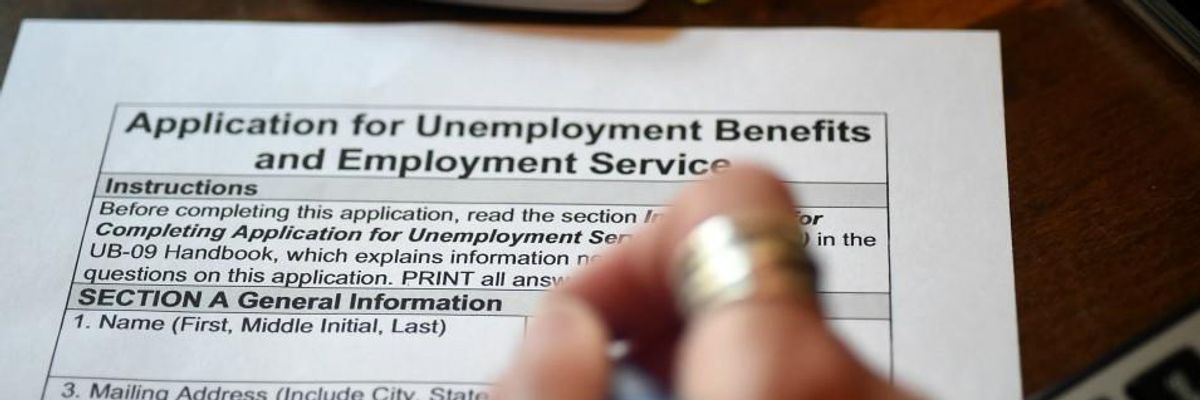
A person files an application for unemployment benefits on April 16, 2020 in Arlington, Virginia. (Photo: Olivier Douliery/AFP via Getty Images)
To donate by check, phone, or other method, see our More Ways to Give page.

A person files an application for unemployment benefits on April 16, 2020 in Arlington, Virginia. (Photo: Olivier Douliery/AFP via Getty Images)
As the nation continues to be consumed with the election--which Joe Biden appears poised to win--millions of people across the country remain out of work. The latest data from the Bureau of Labor Statistics show that 638,000 jobs were added in October, a continued slowdown in job growth. The U.S. economy is still down 10 million jobs from where it was in February, before the pandemic hit. Using average monthly job growth over the year ending February 2020 as the counterfactual, the jobs deficit is over 11.6 million. In other words, that's 10.0 million fewer jobs we have than in February, plus nearly 1.6 million jobs we would have added if the recession hadn't occurred.
Even without the 147,000 loss in temporary Census employment in October, the economy added only 785,000 jobs. At this pace, it will take years for the U.S. economy to fully recover. With long-term unemployment on the rise and little hope for additional relief, workers and their families do not have years to keep their heads above water. As the winter approaches and COVID-19 cases continue to rise, millions of people across the country will be left out in the cold. Unlike his predecessor, the incoming Biden administration will inherit a devastated labor market that will need considerable relief and stimulus--quickly.
Key numbers from today's report:
Policymakers cannot ignore the economic devastation happening to workers and their families across the country. The hopes of a quick recovery have long since been dashed, but swift action can lessen the continued hardship faced.
Trump and Musk are on an unconstitutional rampage, aiming for virtually every corner of the federal government. These two right-wing billionaires are targeting nurses, scientists, teachers, daycare providers, judges, veterans, air traffic controllers, and nuclear safety inspectors. No one is safe. The food stamps program, Social Security, Medicare, and Medicaid are next. It’s an unprecedented disaster and a five-alarm fire, but there will be a reckoning. The people did not vote for this. The American people do not want this dystopian hellscape that hides behind claims of “efficiency.” Still, in reality, it is all a giveaway to corporate interests and the libertarian dreams of far-right oligarchs like Musk. Common Dreams is playing a vital role by reporting day and night on this orgy of corruption and greed, as well as what everyday people can do to organize and fight back. As a people-powered nonprofit news outlet, we cover issues the corporate media never will, but we can only continue with our readers’ support. |
As the nation continues to be consumed with the election--which Joe Biden appears poised to win--millions of people across the country remain out of work. The latest data from the Bureau of Labor Statistics show that 638,000 jobs were added in October, a continued slowdown in job growth. The U.S. economy is still down 10 million jobs from where it was in February, before the pandemic hit. Using average monthly job growth over the year ending February 2020 as the counterfactual, the jobs deficit is over 11.6 million. In other words, that's 10.0 million fewer jobs we have than in February, plus nearly 1.6 million jobs we would have added if the recession hadn't occurred.
Even without the 147,000 loss in temporary Census employment in October, the economy added only 785,000 jobs. At this pace, it will take years for the U.S. economy to fully recover. With long-term unemployment on the rise and little hope for additional relief, workers and their families do not have years to keep their heads above water. As the winter approaches and COVID-19 cases continue to rise, millions of people across the country will be left out in the cold. Unlike his predecessor, the incoming Biden administration will inherit a devastated labor market that will need considerable relief and stimulus--quickly.
Key numbers from today's report:
Policymakers cannot ignore the economic devastation happening to workers and their families across the country. The hopes of a quick recovery have long since been dashed, but swift action can lessen the continued hardship faced.
As the nation continues to be consumed with the election--which Joe Biden appears poised to win--millions of people across the country remain out of work. The latest data from the Bureau of Labor Statistics show that 638,000 jobs were added in October, a continued slowdown in job growth. The U.S. economy is still down 10 million jobs from where it was in February, before the pandemic hit. Using average monthly job growth over the year ending February 2020 as the counterfactual, the jobs deficit is over 11.6 million. In other words, that's 10.0 million fewer jobs we have than in February, plus nearly 1.6 million jobs we would have added if the recession hadn't occurred.
Even without the 147,000 loss in temporary Census employment in October, the economy added only 785,000 jobs. At this pace, it will take years for the U.S. economy to fully recover. With long-term unemployment on the rise and little hope for additional relief, workers and their families do not have years to keep their heads above water. As the winter approaches and COVID-19 cases continue to rise, millions of people across the country will be left out in the cold. Unlike his predecessor, the incoming Biden administration will inherit a devastated labor market that will need considerable relief and stimulus--quickly.
Key numbers from today's report:
Policymakers cannot ignore the economic devastation happening to workers and their families across the country. The hopes of a quick recovery have long since been dashed, but swift action can lessen the continued hardship faced.